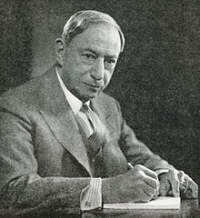|
October 1967 Radio-Electronics
 [Table of Contents] [Table of Contents]
Wax nostalgic about and learn from the history of early electronics.
See articles from Radio-Electronics,
published 1930-1988. All copyrights hereby acknowledged.
|
Nobody is irreplaceable.
That is a common argument offered in response to an assertion that a particular
person is the only one capable of fulfilling a certain role in business, sports,
community, and other areas. While it is mostly true (except in the case of some
personal relationships), securing the service of that person is capable of filling
the figurative shoes of the contested soul is often difficult or impossible. A more
accurate argument might be that out of the field of people qualified to replace
someone in a particular role, the likelihood of doing so is essentially zero. To
my knowledge, nobody ever uttered any form of that statement regarding me; however,
many certainly said it about Hugo Gernsback. Except for here on RF Cafe, Hugo
Gernsback is not often mentioned these days, but throughout the first half of the
last century, his name was well known by those with an interest in science, electronics,
and science fiction. This pseudo-eulogy / mini-biography appeared in the October
1967 issue of Radio-Electronics magazine, which was the last of many publications
he founded and managed. RIP, Mr. Gernsback. A more extensive
commemoration to Mr. Gernsback appeared the following month.
Hugo Gernsback, 1884-1967
 Hugo Gernsback, Editor-in-Chief of Radio-Electronics,
writer, publisher, educator, inventor and prophet, died August 19 in New York City.
His age was 83. Hugo Gernsback, Editor-in-Chief of Radio-Electronics,
writer, publisher, educator, inventor and prophet, died August 19 in New York City.
His age was 83.
Born in Luxembourg August 16, 1884, Gernsback received an electrical engineering
education at the Technikum in Bingen, Germany. He came to the United States in 1904
to exploit an invention - an improved dry battery. A year later he started the Electro
Importing Co., the world's first radio supply house.
In 1906 Gernsback founded Modern Electrics, the first of a long series of radio
and technical magazines. He sold it in 1912, and after a series of combinations,
it became one of the ancestors of today's Popular Science. He immediately started
a larger magazine, the Electrical Experimenter (which became Science and Invention
in 1921). In 1919 he established a purely radio magazine, Radio Amateur News. It
became Radio News in 1920 and still exists as Electronics World.
When Radio News passed into other hands, Gernsback founded a new magazine, Radio-Craft
(now Radio-Electronics). It first appeared on the stands in July, 1929. Other magazines
were Television (1929) and Television News (1932-33). He also published numbers
of other technical, bio-medical and aviation magazines. In 1926 he established the
world's first science-fiction magazine, Amazing Stories (still in existence). He
is known as the father of modern science fiction.
Always a champion of the radio enthusiast; whether amateur, experimenter or professional,
Gernsback's crusading for the rights of the early "hams" caused the American Radio
Relay League to refer to him at one time as the Father of Amateur Radio. His Wireless
League of America, founded in 1909, was an early amateur group. He encouraged and
sponsored the engineers' association that later became the Institute of Radio Engineers
(now IEEE) and tried to establish a radio service technicians' organization, the
Official Radio Service Men's Association (ORSMA).
As inventor, Gernsback obtained some 80 patents, including one on the compression-type
capacitor (the principle used in trimmers) and the use of bone conduction as an
aid to hearing.
Best known to the general public as a prophet, Gernsback's most striking prediction
was the description of radar, which appeared in the Modern Electrics serial "Ralph
124C 41+. In the same story he predicted space travel, microfilm, two-way television,
germicidal rays, tape recording (with quarter-inch tape!), night baseball, artificial
silk and wool, and fluorescent lights.
He was the author of three books, The Wireless Telephone (1908), Radio for All
(1922) and Ralph 124C 41+, which appeared in book form in 1925. A second edition
was published in 1950 and a paperback edition was put out by Crest Books in 1958.
A Russian translation was published in 1964.
In 1928, his radio station, WRNY in New York City, was the first to broadcast
television on a regular schedule. The miniature pictures were not considered entertainment
quality even in that day, but were faithfully received by mote than 2,000 amateur
viewers.
He leaves four children, Madelon of Rome, Italy; M. Harvey of New York (publisher
of Radio-Electronics); Mrs. Tina Baer of New York and Mrs. Jocelyn Neichin of Monsey,
N.Y., seven grandchildren and one great-grandchild.
A complete story of the many-sided genius who was Hugo Gems-back will appear
in the next issue.
|





 Hugo Gernsback, Editor-in-Chief of Radio-Electronics,
writer, publisher, educator, inventor and prophet, died August 19 in New York City.
His age was 83.
Hugo Gernsback, Editor-in-Chief of Radio-Electronics,
writer, publisher, educator, inventor and prophet, died August 19 in New York City.
His age was 83. 

